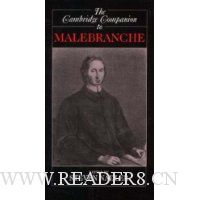基本信息·出版社:Cambridge University Press ·页码:332 页 ·出版日期:2000年07月 ·ISBN:052162729X ·条形码:9780521627290 ·装帧:平装 ·丛 ...
| 商家名称 |
信用等级 |
购买信息 |
订购本书 |
|
|
 |
The Cambridge Companion to Malebranche |
 |
|
 |
The Cambridge Companion to Malebranche |
 |

基本信息·出版社:Cambridge University Press
·页码:332 页
·出版日期:2000年07月
·ISBN:052162729X
·条形码:9780521627290
·装帧:平装
·丛书名:Cambridge Companions to Philosophy
·外文书名:剑桥哲学指南: 马尔布朗谢
内容简介 The French philosopher and theologian Nicholas Malebranche was one of the most important thinkers of the early modern period. A bold and unorthodox thinker, he tried to synthesize the new philosophy of Descartes with the religious Platonism. This is the first collection of essays to address Malebranche's thought comprehensively and systematically. There are chapters devoted to Malebranche's metaphysics, his doctrine of the soul, his epistemology, the celebrated debate with Arnauld, his philosophical method, his occasionalism and theory of causality, his philosophical theology, his account of freedom, his moral philosophy, and his intellectual legacy.
编辑推荐 Review "Nadler, the author of many papers on Malebranche and seventeenth-century metaphysics and a philosophical biography of Spinoza, is to be thanked for assembling and in some cases translating this set of papers by well-known historians.... Malebranche's beautiful and fluid style, his range of scientific and philosophical interests, and his intellectual tenacity should win him a new generation of readers." The Philosophical Review
"The essays are all of high quality, and there is an excellent bibliography." Choice
Product Description The French philosopher and theologian Nicholas Malebranche was one of the most important thinkers of the early modern period. A bold and unorthodox thinker, he tried to synthesize the new philosophy of Descartes with the religious Platonism of St. Augustine. This is the first collection of essays to address Malebranche's thought comprehensively and systematically. There are chapters devoted to Malebranche's metaphysics, his doctrine of the soul, his epistemology, the celebrated debate with Arnauld, his philosophical method, his occasionalism and theory of causality, his philosophical theology, his account of freedom, his moral philosophy, and his intellectual legacy.




